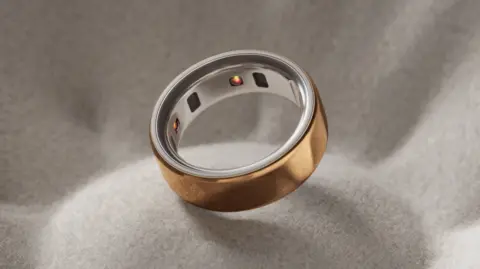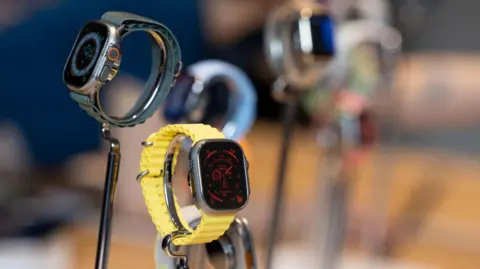 Oura
OuraWearable tech – presently dominated by good watches – is a multi-billion greenback business with a pointy deal with well being monitoring.
Many premium merchandise declare to precisely observe train routines, physique temperature, coronary heart fee, menstrual cycle and sleep patterns, amongst others.
Well being Secretary Wes Streeting has talked a couple of proposal to give wearables to tens of millions of NHS sufferers in England, enabling them to trace signs akin to reactions to most cancers remedies, from residence.
However many medical doctors – and tech consultants – stay cautious about utilizing well being knowledge captured by wearables.
I’m presently attempting out a wise ring from the agency Ultrahuman – and it appeared to know that I used to be getting sick earlier than I did.
It alerted me one weekend that my temperature was barely elevated, and my sleep had been stressed. It warned me that this might be an indication I used to be coming down with one thing.
I tutted one thing concerning the signs of perimenopause and ignored it – however two days later I used to be laid up in mattress with gastric flu.
I didn’t want medical help, but when I had – would the information from my wearable have helped healthcare professionals with my therapy? Many wearable manufacturers actively encourage this.
The Oura good ring, for instance, presents a service the place sufferers can obtain their knowledge within the type of a report back to share with their physician.
 Getty Pictures
Getty PicturesDr Jake Deutsch, a US-based clinician who additionally advises Oura, says wearable knowledge allows him to “assess total well being extra exactly” – however not all medical doctors agree that it’s genuinely helpful all the time.
Dr Helen Salisbury is a GP at a busy follow in Oxford. She says not many sufferers are available brandishing their wearables, however she’s seen it has elevated, and it considerations her.
“I feel for the variety of occasions when it’s helpful there’s in all probability extra occasions that it’s not terribly helpful, and I fear that we’re constructing a society of hypochondria and over-monitoring of our our bodies,” she says.
Dr Salisbury says there might be numerous the explanation why we’d briefly get irregular knowledge akin to an elevated coronary heart fee, whether or not it’s a blip in our our bodies or a tool malfunction – and plenty of of them don’t require additional investigation.
“I’m involved that we’ll be encouraging individuals to watch all the things on a regular basis, and see their physician each time the machine thinks they’re sick, reasonably than after they suppose they’re sick.”
And he or she makes an additional level concerning the psychological use of this knowledge as a type of insurance coverage coverage in opposition to shock well being diagnoses. A nasty cancerous tumour for instance, just isn’t essentially going to be flagged by a watch or an app, she says.
What wearables do is encourage good habits – however the most effective message you may take from them is similar recommendation medical doctors have been giving us for years. Dr Salisbury provides: “The factor you may really do is stroll extra, don’t drink an excessive amount of alcohol, try to preserve a wholesome weight. That by no means adjustments.”
The Apple Watch is reported to be the world’s best-selling good watch, though gross sales have slowed recently.
Apple did not remark, however the tech large makes use of true tales of individuals whose lives have been saved due to the guts monitoring operate of the system in its advertising and marketing, and anecdotally I’ve heard loads of these too. What I haven’t heard nevertheless, is what number of circumstances of false positives there are.
In lots of circumstances when sufferers current their knowledge to healthcare professionals, clinicians choose to attempt to recreate it utilizing their very own gear, reasonably than merely belief what the wearable has captured.
There are a number of causes for this, says Dr Yang Wei, affiliate professor in wearable applied sciences at Nottingham Trent College – and so they’re all very sensible.
“Once you go to hospital, and also you measure your ECG [electrocardiogram, a test that checks the activity of your heart], you don’t fear about energy consumption as a result of the machine is plugged into the wall,” he says.
“In your watch, you’re not going to measure your ECG repeatedly since you drain your battery right away.”
As well as, motion – each of the wearable itself on a wrist, for instance, and normal motion of the particular person carrying it – can “create noise” within the knowledge it collects, he provides, making it much less dependable.
 Helen Salisbury
Helen SalisburyDr Wei factors to the ring on my finger.
“The gold commonplace to measure the guts fee is from the wrist or direct from the guts,” he says. “For those who measure from the finger, you’re sacrificing accuracy.”
It’s the function of software program to fill in such knowledge gaps, he says – however there’s no worldwide commonplace for wearables right here – for both the sensors and software program that energy wearable units, or for the information itself, and even what format it’s gathered in.
The extra constantly a tool is worn, the extra correct its knowledge is more likely to be. However right here’s a cautionary story.
Ben Wooden was out for the day when his spouse acquired a collection of alarming notifications from his Apple Watch, telling her he had been in a automotive crash. It suggested her to textual content him reasonably than name as a result of he could must maintain the road clear for the emergency companies.
The alerts have been real, and despatched to her as his emergency contact – however on this case pointless. Ben was out at a race observe driving some quick vehicles. He admitted that he “wasn’t very gifted” at it – however stated he felt secure always.
“The boundaries between incident and alert have to be managed rigorously,” he wrote in a weblog submit. “I’m curious to see how device-makers, emergency companies, first responders and people take into consideration this expertise sooner or later.”
Pritesh Mistry, digital applied sciences fellow on the Kings Fund, agrees that there are vital challenges round folding present patient-generated knowledge into our healthcare techniques, and provides that the dialogue has already been occurring for a number of years within the UK with none clear decision.
He says there’s “a very good case to be made” for using wearables within the UK authorities’s present drive to push care out of hospitals and into neighborhood settings.
“However with out that underpinning basis of expertise enablement by way of the infrastructure, and supporting the workforce to have the abilities, data, capability and confidence, I feel it’s going to be a problem,” he provides.

